What is the best cheap Fujitsu scanner?
Most offices simply cannot function efficiently without a proper document scanner. Regardless if you’re mainly dealing with photographs, receipts, or applications, you'll easily find a Fujitsu office scanner that will suit you perfectly. This article goes over 7 top-rated options that have proven to offer superior portability, workload capacity, and price efficiency.
Whether you need a portable device that can be easily transported or a reliable machine for your office, you’ll find the best Fujitsu scanner for your needs below.
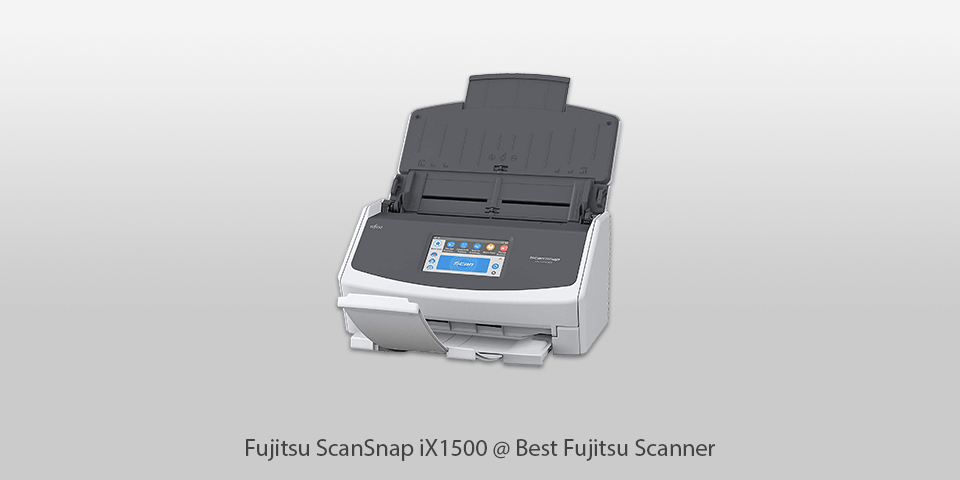
Optical scan resolution: 600dpi | Scanning speed: 30ppm | Interface: USB | Feeder capacity: 50
⊕ High precision OCR
⊕ Refined software that provides financial data support
⊕ Multiple connectivity options
⊕ Convenient and intuitive
⊖ Doesn’t offer Ethernet connectivity
If your scanning needs are limited, then the iX1500 is probably the best Fujitsu scanner for you. Moreover, if your work involves making receipt scans, then this is a far more attractive option compared to the more popular ADS-2700W model.
The only downsides of this scanner include the lack of Ethernet connectivity, a slightly worse precision rating, and a price increase of $100. Despite those flaws, the iX1500 remains a worthy inclusion on this list and can be recommended to most users.
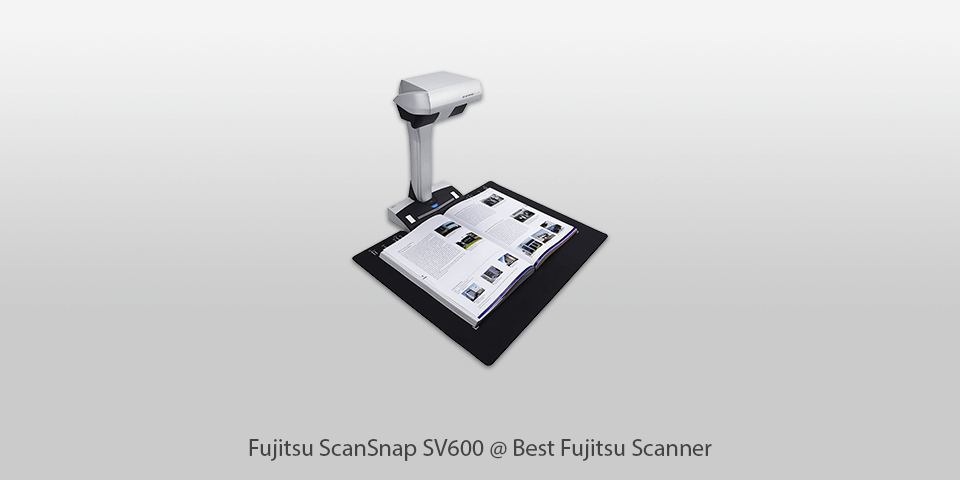
Optical scan resolution: 285-218dpi | Scanning speed: 3 seconds per page | Interface: USB | Feeder capacity: -
⊕ Can be used for scanning everything
⊕ Compact body
⊕ Great performance
⊖ Subpar page distortion
⊖ Can’t be used for scanning transparent sheets
Given how complex the process of scanning a document is, the results produced by this model are nothing short of mind-blowing. It’s widely considered to be the best Fujitsu scanner for archives, public libraries, and other establishments where visitors tend to scan a couple of pages while having zero risks of harming the originals.
The SV600 does suffer from a couple of setbacks though, as curvature correction needs to be improved and the post-scanning processes have to become automated.
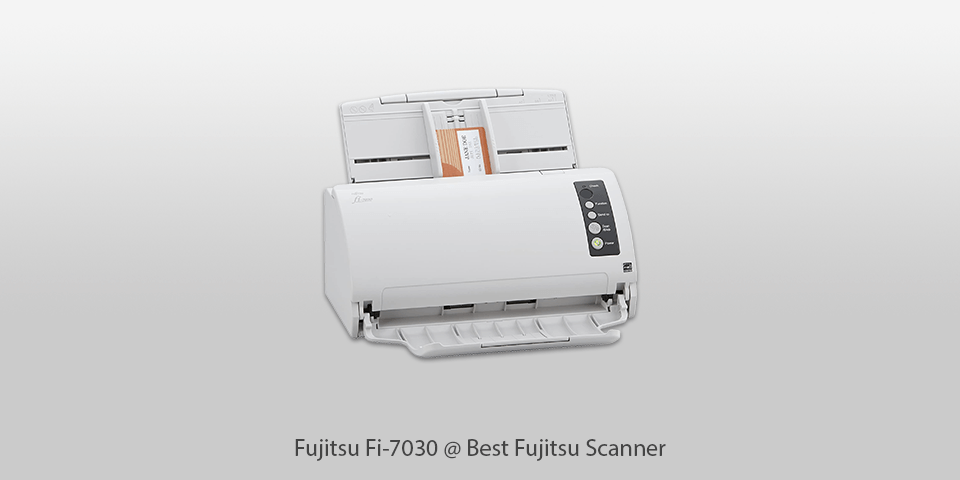
Optical scan resolution: 600dpi | Scanning speed: 27ppm | Interface: USB | Feeder capacity: 50
⊕ Durable and well-built
⊕ Simple installation
⊖ Design could benefit from some further refinement
Fi-7030 is a terrific Fuji desktop scanner that offers a large ADF and solid scanning speed, while the device itself is pleasantly sturdy and reliable. In terms of performance, this product is way above average, as it allows you to scan about 1000 sheets per day, making it a great choice for most workspaces that have to do a lot of scanning regularly. Combine such a workload capacity with the high scanning speed and you have a scanner that will ensure all of your documents are digitized in time.
The manufacturer managed to improve both color and grayscale scanning performance, as you receive your results up to 35% faster compared to the previous version of this scanner, which is a noticeable upgrade.
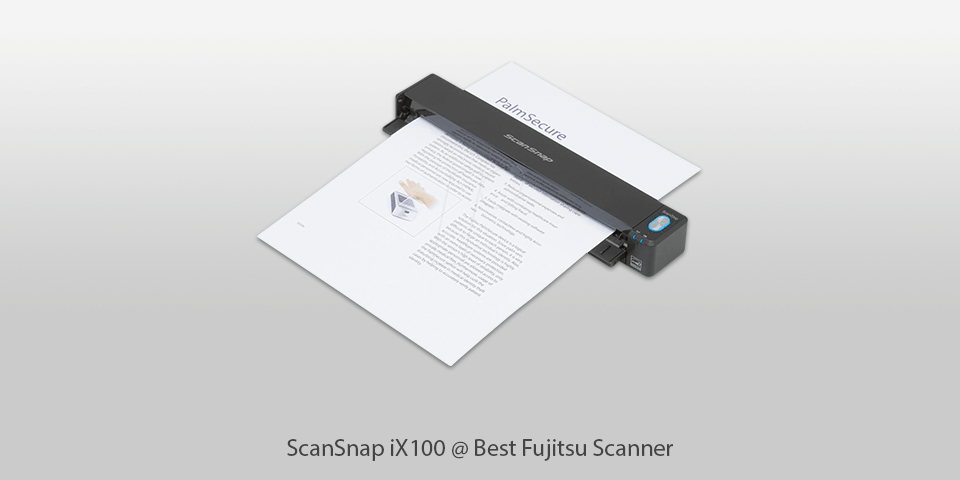
Optical scan resolution: 600dpi | Scanning speed: 5.2 seconds / page | Interface: USB/Wi-Fi | Feeder capacity: 50
⊕ Terrific portability
⊕ Wi-Fi and Wi-Fi Direct connectivity
⊕ Allows scanning even without a PC
⊕ Save scans on your phone or tablet
⊖ Doesn’t offer a duplex scanning mode
iX100 is an incredibly small Fujitsu wireless scanner that is powered by a heavy-duty battery. It’s suitable for creating digital copies of receipts, documents, business cards, applications, and contracts while offering the portability that can't be found in most other scanners.
This model is fully wireless and weighs a mere 400g. The compatibility options are also quite impressive, as you can use the iX100 with your computer, Mac, iPhone, or Android smartphone.
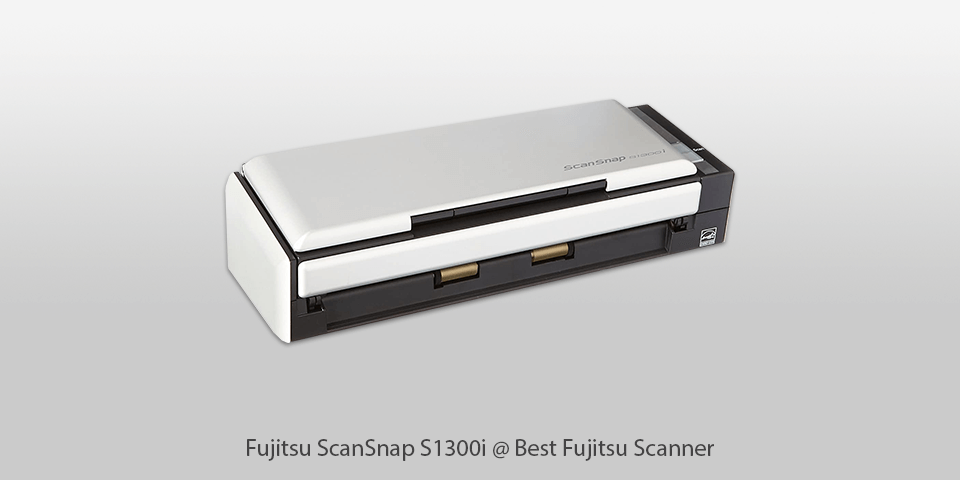
Optical scan resolution: 600dpi | Scanning speed: 12ppm | Interface: USB | Feeder capacity: 10
⊕ Terrific scanning results
⊕ Intuitive software
⊕ Reasonably priced
⊖ Mediocre speed
⊖ 10-sheet ADF isn’t all that impressive
S1300i just might be the best Fujitsu scanner for users interested in a mix of portability and quality. However, despite its compact size, this model does suffer from some flaws that aren’t present in bulkier scanners. The first thing you’ll notice is the small document feeder that has a capacity of only 10 sheets. This makes using the S1300i far less convenient if you have to scan long documents.
Epson’s ES-400 provides the same level of quality while being supplied with a 50-sheet ADF. Thus, this is the superior option only for users that value portability highly and can be certain they won’t have to deal with longer documents regularly.
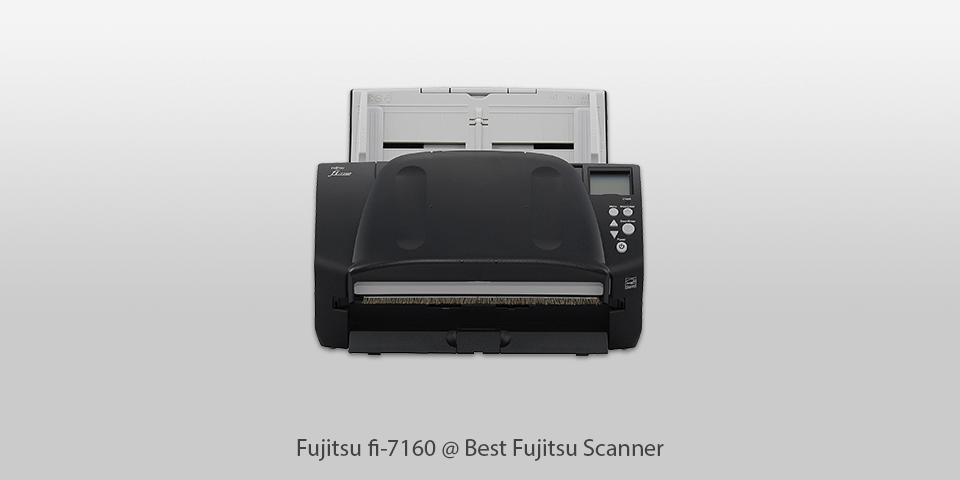
Optical scan resolution: 600dpi | Scanning speed: 60ppm | Interface: USB | Feeder capacity: 80
⊕ Great speed
⊕ Small size
⊕ Solid array of features
⊖ Inconsistent OCR results
The fi-7160 is a Fujitsu high speed scanner that comes with an array of handy features. It’s a solid option for medium and small business owners or student groups that are in search of a scanner that can handle substantial document volumes with high speed.
Sadly, the OCR accuracy can be quite a letdown sometimes, so if creating searchable PDFs is necessary for you, consider getting a different model instead.
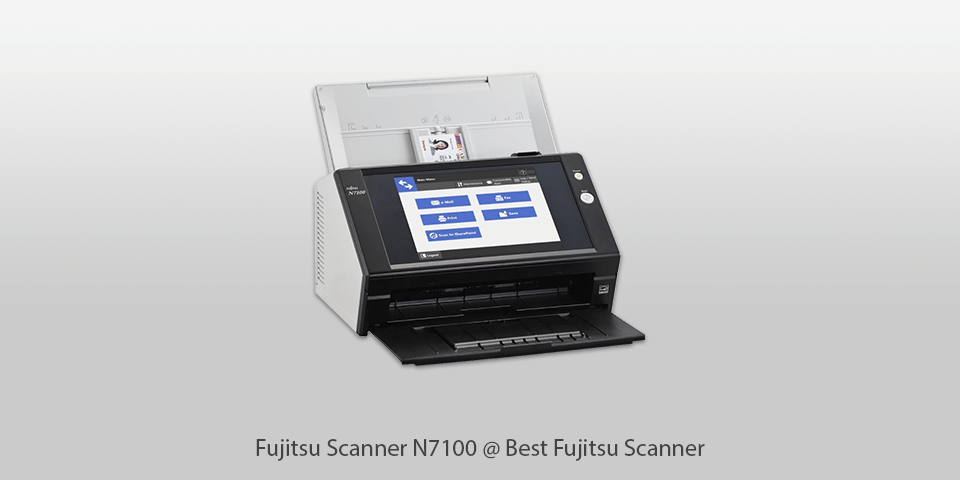
Optical scan resolution: 600dpi | Scanning speed: 25ppm | Interface: USB, Ethernet| Feeder capacity: 50
⊕ Great quality
⊕ Impressive performance
⊖ Expensive
N7100 deserves to be considered for the title of the best Fujitsu scanner because it manages to scan huge volumes of documents despite being a compact device. Additionally, this model provides multiple output options, making it easier to find a place for it in your workplace.
N1700 comes with an ADF, which has a capacity of 50 sheets and offers color scanning, letting you digitize multipage contracts with ease. This device can work at a speed of 25ppm with 300dpi, which makes it suitable for scanning IDs, credit cards, medical documentation, financial reports, and much more. The provided software is also highly convenient and can automatically establish the size, orientation, and colors of the documents as well as deal with blank pages.
| Image | Name | Features | |
|---|---|---|---|
 |
Fujitsu ScanSnap iX1500
Our Choice |
CHECK PRICE → | |
 |
Fujitsu ScanSnap SV600
Book |
CHECK PRICE → | |
 |
Fujitsu Fi-7030Affordable
|
CHECK PRICE → |
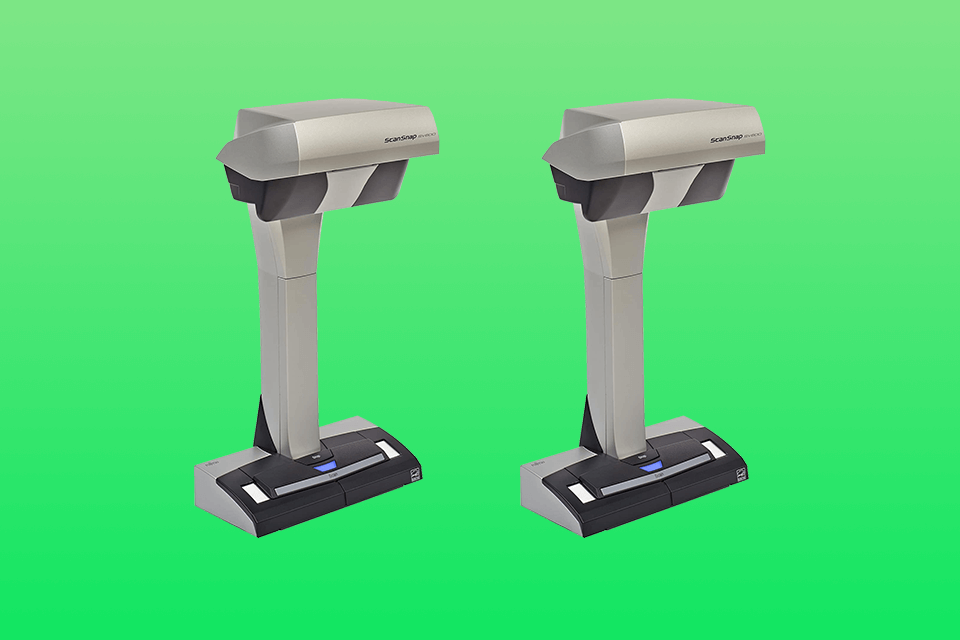
Picking a Fujitsu scanner that will offer everything you need is no easy task. The majority of options available on the market are fully capable of tackling everyday work projects, but since scanners differ in size and functionality, they aren’t equally well-suited for the same purposes. These are the questions that you have to answer before you make your decision.
Determining what type of documents and how regularly you’ll have to scan will help you easily decide what features in a scanner you should be looking for. Most users typically use scanners for photographs and documents, but some people also need to digitize hardcover books, business and credit cards, film rolls, magazines, stamps, and so on. 3D objects like coins or dry flowers are also an option. Regardless of your answer to this question, pick a model that can fit the max size of the media you will scan and think about whether double-sided scanning will be required.
A Fujitsu flatbed scanner is necessary if you plan on scanning fragile originals, bound books, or various 3D items. Such a model comes with a big glass horizontal surface that is perfect for placing paper sheets, books, and objects. Keep in mind that when this article discusses 3D objects, it refers to scanning them as 2D images, since scanners for creating 3D objects are far more complex and expensive compared to regular ones.
Even though it’s possible to put a photograph or a postage stamp through a sheet feeder, the risk of them being stuck, harmed, or torn apart is rather high, especially if they’re old. There is a way to bypass this issue if you only have to scan an original once or twice since most sheet-fed models are supplied with a plastic carrier that keeps the originals safe. That said, even that solution is rather flawed since most such carriers, even if completely new, tend to lower the quality of the scan. Thankfully, getting a good flatbed scanner is rather easy, as the market is full of both new and older models, allowing you to find a suitable product in no time.
If your workflow includes scanning documents each day, especially ones that are more than 3 pages, a sheet feeder is an essential inclusion in a scanner. The process of placing a single page under a flatbed lid feels enough like a hassle as it is, but to do the same thing each time you’re scanning a 20-page contract is both time-consuming and irritating. Besides, several sheet-fed models are capable of passing through thicker documents like ID cards, which can be of great help in many organizations.
If your job doesn’t require a lot of scanning, you can easily make do with a manual sheet-feeding scanner. However, if you often find yourself digitizing bigger documents, an ADF becomes a necessity, as it’s the perfect system for quickly scanning a large stack of papers. Try to find a model that has an ADF capacity that can satisfy the number of pages your average document has. Should you have to scan more sheets than the feeder can hold, you can easily add them during the process. It’s also worth noting that more advanced scanners with ADFs can also pass through stacks of business cards.
A Fujitsu document scanner that comes with a duplex scanning mode allows you to scan both sides of a document simultaneously. If you plan to purchase a model with a manual or automatic sheet feeder and often deal with two-sided pages, then you should strongly consider getting a duplexing scanner since otherwise the amount of work you’ll have to do will increase twofold.
Scanners that offer the best performance are equipped with 2 scanning mechanisms that act together to digitize both page sides simultaneously. Such models are much faster compared to a regular scanner with a basic duplexing automatic feeder, but they also come at an increased price. Meanwhile, a duplexing ADF simply scans the first side of a document, flips it over, and then scans the other side, which takes twice as much time.
The third option you have is to buy a scanner that offers a manual duplexing mode. In this case, the device scans the first side of an entire stack of documents, instructs you to turn it around, so that it can scan the second side, and then its driver merges both sides automatically. Such scanners are the cheapest option and are recommended for users that rarely have to deal with double-sided pages or don’t have the budget to buy a more robust model.
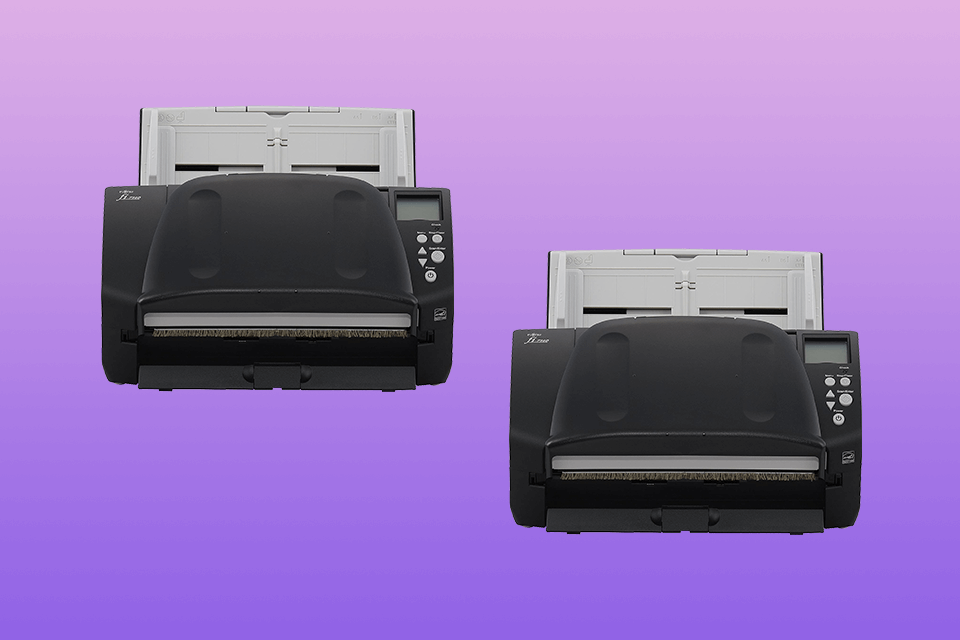
For the majority of scanning tasks, the resolution isn’t very important. For instance, financial reports are perfectly readable even at 200ppi and 300ppi is enough for most types of documents. One of the cases, when you might need a better resolution, is when scanning photos, but even then, you’ll be hard-pressed to find a Fujitsu photo scanner with less than 600ppi, which is all the pixels you need to print out even enlarged versions of a picture.
That said, some media demand better resolution. If you're working with 35mm film negatives, you have to print them out in a significantly bigger size than the original, meaning the resolution has to be quite high, otherwise you’ll notice pixelation. Similarly, if you want to scan a postage stamp while preserving all the details, you can only consider models that have a resolution of 4800ppi or even higher.
Choosing a model that can fit the originals you have to scan seems like a no-brainer, but some users still often overlook this aspect. For instance, the majority of flatbed scanners come with a letter-size surface, which quickly becomes an issue if you scan legal-size documents from time to time. Thankfully, most flatbed models that have an ADF are compatible with legal-size pages, but that’s not the case for all of them, so verify that fact before committing to a purchase. It’s also possible to find larger flatbed scanners, but those are more expensive and require more space.
Regardless if it’s a Fujitsu scanner for Mac or Windows, most models offered by this brand are compatible with nearly all scanning software. However, if the product comes with its software, you don’t need to purchase separate programs unless you need specific features. The most popular tools included in scanning software are image editing, optical character recognition (OCR), searchable PDF creation, business card archiving, and document management.
The last thing you have to think about is whether you need a special-purpose model instead of a regular one. Special-purpose scanners include ones for business cards (compact, portable devices), books (perfect for laying out the pages flat), and slides (more compact than flatbed scanners while providing the same level of quality).
Other options include portable devices (general-purpose scanners that can be carried in a laptop bag) and pen models (handheld models that are traced over text). Several state-of-the-art portable scanners can be used even without a PC, as you can save the scans on an SD-card or your phone instead. The market also offers scanners that can be used as both portable and desktop devices, as they combine a portable component with a docking station that hosts the ADF. Any of the aforementioned options can become a terrific choice if you decide that a general-purpose scanner won’t be able to satisfy your needs.
The iX1500 is probably the most well-rounded option, as it offers reliability, high accuracy, user-friendliness, and an ADF, all of which make it the ideal choice for home and small business usage.
Scanners supplied with an ADF offer the best performance by a longshot. Even though document feeders can be designed in different ways, they all serve the purpose of automating the process of dragging stacks of sheets through the scanning system one by one with minimum user involvement.
The overwhelming majority of scanners have a color-scanning mode, which makes them suitable for creating digital copies of photographs, contracts, IDs, books, maps, business cards, and much more.
There’s no single right answer to this question, as both printers and scanners come at all sorts of price points, depending on the functionality and manufacturer of a specific model. That said, on average, an all-in-one printer costs more than a scanner since it typically comes with more features.

 Rating
Rating